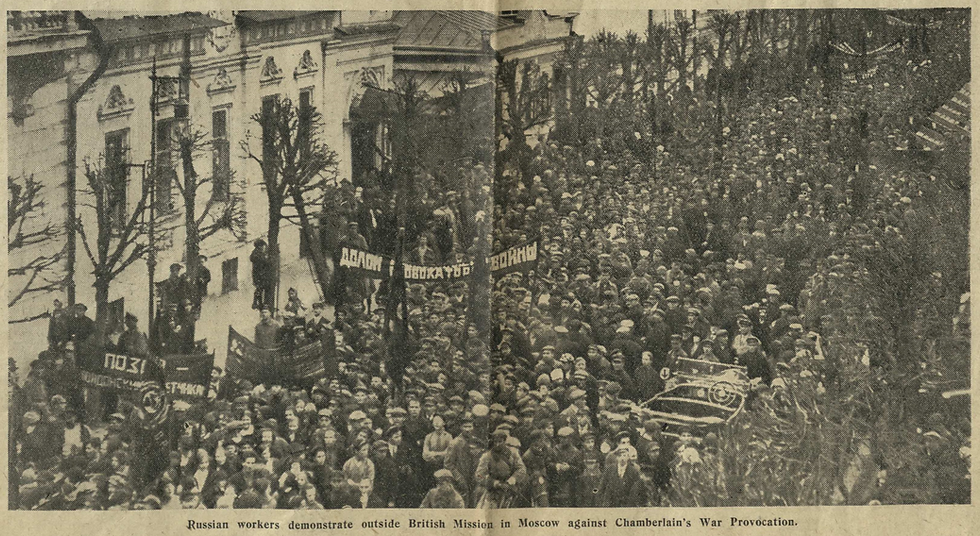Codebreakers, Communists, and the Catastrophic Raid on ARCOS
- Elodie d'Isadora
- Feb 13, 2019
- 3 min read
The date is 12 May, 1927—two years before the collapse of the global stock market, and, with it, the luxury of jazz in your ears and coffee on your lips. It’s 4:30 in the afternoon—rush hour for your comrades not on break, as they shuffle about, papers in hand. Suddenly, the London Metropolitan Police burst through the doors, interpreters in tow, and you rush to shred and burn whatever documents you can find before you’re apprehended1. You know the media is going to have a field day with this.
You, in this case, are an employee of the All Russian Cooperative Society (ARCOS). While, in the words of Nick Barrett, “there was no smoking gun evidence of espionage[, t]he consequences were monumental. (113)2” Anglo-Russian tensions had reached a fever pitch, and the seeds of the Cold War had been thoroughly sown.
But…How did We Get Here?
The “ARCOS Raid,” as historians now call it, was and is a testament to the international race for dominance not in science or the military, but in cryptography. Since its entrance into the realm of pop culture with the release of The Imitation Game 5 years ago, we have understood intuitively how political and military action throughout history has often been predicated by the concealment and deciphering of messages and plans. However, most associate such things with the computational capabilities of the modern world—the stuff of cybersecurity experts, not of clerks, dictionaries, and transcribers. Such was the case in the late 19th and early 20th Centuries—whoever owned the codebooks for a particular nation practically had their eyes and ears trained on their deepest, dirtiest secrets.

3
So, you can probably guess as to why, upon hearing that a vital deciphering manual had been stolen and photocopied by someone in ARCOS (via years’ worth of phone tapping and tailing2), British Home Secretary William Joynson-Hicks jumped at the chance to procure a search warrant to search society headquarters.1
What Did They Find?
Underwhelmingly enough…not the manual in question. But, excitingly, many more equally questionable things—“250,000 other pieces of evidence, from rifles and lifeboats to the ‘human document, Anton Miller, caught burning papers in the fireplace of the cipher room.” Damage to the building itself was catastrophic, and readers of the day could look with satisfied (or sobered) eyes at newspaper photographs of the scorched remains, now only available, coincidentally, by photocopy from the National Archives.1
Why did it Matter, Then?
Predictably, a police raid on Russian intelligence did not translate well politically. Paranoia targeted towards the USSR was now fully justified. The soviets, in response, updated their own codes and security systems, majorly injuring British intelligence.2 Economically, the already tenuous trade arrangement between the two nations dissolved1 with Stalin claiming, “coexistence with capitalist countries ‘is receding into the past.’”2 Without the apocalyptic fears of the atomic age to keep them in check, civilians took to the streets in protest:

4
Within a matter of days, the curtain had been lifted, and the Cold War had reached its first act.
Of course, this is but one fragment of that puzzle—one that would come to envelop the entire world, and involve countless proxy wars, doublespeak-laden conferences, and, for our purposes, acts of espionage. If you want to gain a lens for how all of these fit together, feel free to track down a copy of the aforementioned Barrett’s captivating new work, The Forgotten Spy: The Untold Story of Stalin’s First British Mole, for this year’s Book Group.
Works Cited:
Flory, Harriette. “The Arcos Raid and the Rupture of Anglo-Soviet Relations, 1927.” Journal of Contemporary History, vol. 12, no. 4, 1977, pp. 707–723. JSTOR, www.jstor.org/stable/260168.
Barratt, Nick. The Forgotten Spy: The Untold Story of Stalin's First British Mole. Blink Publishing, 2016.
Brüning, Rainer et al. Berckheim Telegram. 2014. People in the war on the Upper Rhine 1914-1918. https://de.wikipedia.org/wiki/Datei:WW1_Berckheim-Telegramm.jpg. Digital Photograph. 17 January, 2019.
Russian workers protest outside British Mission in Moscow, 1927. https://warwick.ac.uk/services/library/mrc/explorefurther/digital/russia/arcos/. Digital Photograph. 17 January, 2019.





